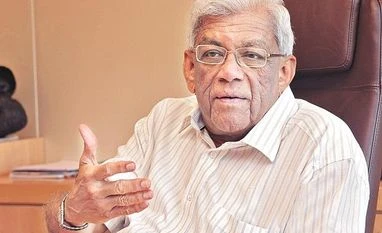Housing Development Finance Corp (HDFC) chairman Deepak Parekh said on Tuesday that while India’s macroeconomic fundamentals are strong and recovery is underway, weak credit growth remains the key laggard.
“Owing to the second wave, the Indian economy is likely to mirror a similar trend seen in FY21, where the first half of the financial year is weaker and the second half is significantly stronger,” Parekh said in his chairman’s address at the 44th Annual General Meeting of HDFC.
However, in terms of the overall macroeconomic environment, “the key challenge remains the unpredictability of the virus. The world is still susceptible to recurring waves of infections. Thus, economic recovery will remain uneven and patchy,” he said.
Parekh expressed hope that the third wave of the pandemic won’t be as severe as the second wave as more people get vaccinated. “Let's hope in India, we get more and more people vaccinated. The key here is more vaccination.”
There are a couple of factors working in favour of India. The foreign exchange reserves and foreign direct investment inflows are at a record high, agriculture growth is expected to remain strong with foodgrains estimated at over 305 million tonnes. RBI’s accommodative stance and government measures to alleviate covid-related stress would also help in the recovery, Parekh said.
Later, answering shareholders’ query, Parekh said Mistry did not want a lengthy extension.
"We could have given him 10 years but he did not want even three years. The board had to force him on accepting a three-year extension,” Parekh said on Mistry.
HDFC is “very happy” with its investments in HDFC Ergo and its insurance venture, but in the case of Ergo, it will have to reduce its stake from 50.6 per cent to 50 per cent as per RBI directive, Parekh said. Listing of some subsidiaries is also some time away as these companies have to grow first.
Parekh also said it was not possible for HDFC to form a holding company, as against any family-run firm such as Bajaj Finance.
“If we are a holding company, who's going to give us the capital? A family-run company can put any amount of money in the holding company when their subsidiaries need money. If HDFC splits itself into two companies -- the housing vertical and a holding company -- wherever from we raise money all the time when all our subsidiaries need money?”
“The Coronavirus (Covid-19) pandemic has reaffirmed that there can be no greater security in life than a home. The inherent demand for home loans continues to remain strong,” Parekh said in his opening speech.
The national lockdown impacted individual loans, but once restrictions were eased, “the demand surpassed all expectations. We are confident that demand for housing will continue to be strong,” he said.
In FY21, demand for housing was both for affordable and high-end properties. The average size of housing loans stood at 29.5 lakh, compared with Rs 27 lakh in the previous year.
According to the finance veteran, in terms of commercial real estate, most companies have not given up their office premises, and with the e-commerce boom, “demand for real estate is coming from warehousing and fulfillment centres”.
Similarly, with the build-up of digital infrastructure, demand for data centers has increased.
“These are the segments of the real estate sector that have potential to grow immensely,” Parekh said.
HDFC, according to its chairman, will continue to monitor three key factors -- liquidity, growth, and asset quality.
As a prudential measure, the mortgage finance company is maintaining higher levels of liquidity.
However, asset quality has been challenging for non-individual loans at a systemic level, Parekh said. HDFC has identified such loans and has adequately provided against them.
Gross non-performing loans at March 31, stood at Rs 9,759 crore, or 1.98 per cent of the loan portfolio. The company was required to carry total provisions of Rs 5,491 crore, but it carried a provision of Rs 13,025 crore, which is 2.62 per cent of the exposure at default.
The company declared a dividend of Rs 23 per equity share of the face value of Rs 2 each for the financial year.
Parekh said in his question answer round that HDFC being a financial company, has to be cautious and cannot declare dividends or bonus shares at will. The last bonus share was in 2002, and the share split was in 2010 for the company.
The housing finance company has also gradually let go of its high liquidity level as Covid related uncertainties improved.
"In the first wave of COVID, there was a total shortage of liquidity and shortage of capital. Companies were unable to raise money, so we had to keep a much larger buffer as liquidity. With the various liquidity measures taken by RBI, the corporation is maintaining comfortable liquidity levels and minimize the negative carry which we have (more idle liquidity leads to cost).”
HDFC has no plan to list any of its subsidiaries as of now, while it is "always open for acquisitions.” "We are always keeping our eyes and ears open, in case if any good proposal comes to us,” Parekh said.
However, HDFC didn't want to pursue buying DHFL, as even if it looks at all opportunities, it proceeds "only if we find it worth pursuing.” Parekh praised LIC Housing Finance company as a competitor and a well-run company.
On its investment in Yes Bank, Parekh said it cannot be liquidated just now as there is a lock-in period of three years stipulated by the RBI.
Unlock 30+ premium stories daily hand-picked by our editors, across devices on browser and app.
Pick your 5 favourite companies, get a daily email with all news updates on them.
Full access to our intuitive epaper - clip, save, share articles from any device; newspaper archives from 2006.
Preferential invites to Business Standard events.
Curated newsletters on markets, personal finance, policy & politics, start-ups, technology, and more.



)